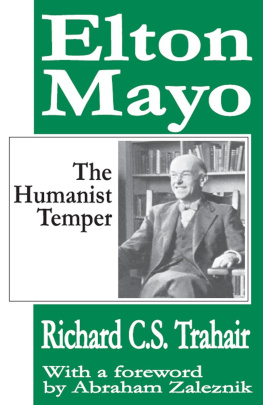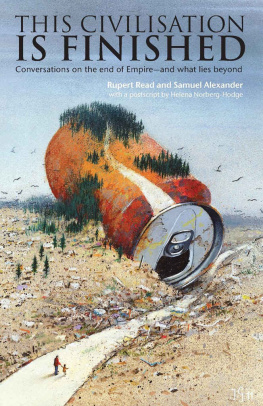The International Library of Sociology
THE SOCIAL PROBLEMS OF AN INDUSTRIAL CIVILIZATION
Founded by KARL MANNHEIM
The International Library of Sociology
ECONOMICS AND SOCIETY
In 11 Volumes
I | The Danube Basin | Basch |
II | The Economic Development of the Middle East | Bonn |
III | Economics of Migration | Issac |
IV | Economy and Society | Parsons et al |
V | The History of Economics | Stark |
VI | The Ideal Foundations of Economic Thought | Stark |
VII | The Political Element in the Development of Economic Theory | Myrdal |
VIII | Population Theories and the Economic Interpretation | Coontz |
IX | The Social Problems of an Industrial Civilization | Mayo |
X | Studies in Economic Development | Bonn |
XI | Transitional Economic Systems | Douglas |
THE SOCIAL PROBLEMS OF AN INDUSTRIAL CIVILIZATION
With an Appendix on the Political Problem
by
ELTON MAYO
foreword by
J. H. SMITH
First published in 1949
by Routledge
Reprinted in 1998, 1999, 2000
by Routledge
2 Park Square, Milton Park, Abingdon, Oxon, OX14 4RN
Transferred to Digital Printing 2007
Routledge is an imprint of the Taylor & Francis Group
1949 Routledge
New foreword 1975 J. H. Smith
All rights reserved. No part of this book may be reprinted or reproduced or utilized in any form or by any electronic, mechanical, or other means, now known or hereafter invented, including photocopying and recording, or in any information storage or retrieval system, without permission in writing from the publishers.
The publishers have made every effort to contact authors/copyright holders of the works reprinted in The International Library of Sociology. This has not been possible in every case, however, and we would welcome correspondence from those individuals/companies we have been unable to trace.
British Library Cataloguing in Publication Data
A CIP catalogue record for this book is available from the British Library
The Social Problems of an Industrial Civilization
ISBN10: 0-415-17532-1 (hbk)
ISBN10: 0-415-43684-2 (pbk)
ISBN13: 978-0-415-17532-6 (hbk)
ISBN13: 978-0-415-43684-7 (pbk)
Economics and Society: 11 Volumes
ISBN 0-415-17819-3
The International Library of Sociology: 274 Volumes
ISBN 0-415-17838-X
Publishers Note
The publisher has gone to great lengths to ensure the quality of this reprint but points out that some imperfections in the original may be apparent
This book is dedicated to
M. L. P UTNAM
H. A. W RIGHT
W. J. D ICKSON
A. C. M OORE
D. D. D AVISSON
H. H IBARGER
the team that worked through the Hawthorne
experiment to its interesting conclusion.
They will understand if I add the name of
G EORGE A. P ENNOCK
E LTON M AYOS Social Problems of an Industrial Civilization was published on the eve of his retirement, after twenty-one years as Professor of Industrial Research at the Harvard Business School. His reputation was then at its peak. An article in Fortune ranked Mayo as a modern social thinker with Thorstein Veblen and John Dewey; it further hailed him as an academic whose views directly challenged the basic assumptions of the practical world of industry.
Scientist and practical clinician, Mayo speaks with a rare authority that has commanded attention in factories as well as Universities. His erudition extends through psychology, sociology, physiology, medicine, and economics, and his experience comes from a lifelong, firsthand study of industry.... Mayos view gives promise of exerting through the field of business administration a significant influence on the future relations of U.S. management and labor. Indeed, many believe that Mayo holds the key to industrial peace.
Among academics, however, there was already more than one view of his contribution and the first of a stream of critical articles had already appeared.
Since then there has been some reduction in frequency, but none in intensity. Mayos name has become synonymous with a narrow (and, to some, ethically questionable) view of social relations in industry; so much so that the terms Mayoite and Mayoism have passed into the pejorative language of social science. A recent appraisal of research needs in industrial relations in Britain tartly reproduces what is now the received wisdom concerning Mayos contribution and outlook.
From the middle of the 1950s, industrial sociologists and psychologists began to show that they could contribute to industrial relations. Human relations had a considerable following among British practitioners of industrial relations, but academics were initially sceptical. For especially as expounded by such writers as Elton Mayo, human relations concentrated on the primary work group and labour-management cooperation, ignoring or belittling most of the topics in which students of industrial relations were interested.
All of which suggests that Mayos work could only be of limited interest today; of little value perhaps except as a paradigm offering a rather threadbare interpretation of the social needs of the industrial worker. Viewed in this way, the best that might be said for him is that Mayos critics have found an analysis of his shortcomings an essential stimulus in clarifying their own views about the proper scope of industrial sociology.
There is of course much more than that to Mayo as the reader of this volume will discover. Indeed, some of the features of Mayos writings which so upset his posthumous criticshis The comparison should not be pressed too farMayo cannot really be put in the same class as Spencer, except possibly on grounds of intellectual arrogancebut there are some interesting similarities. Like Spencer, Mayo is a representative product of his age. Spencer fashioned the essential vocabulary of sociology and social anthropology: Mayo, without ever himself using the term industrial sociology defined its essential point of view in an unmistakeable and (his critics notwithstanding) inescapable form. Amid the pessimisms of the post-welfare society some of Mayos ideaslike Spencersare beginning to be in fashion again: while his views on the methods of social science and their limitations are unconsciously shared by many of those who may have assumed, on ideological grounds, that he is a writer of little interest.















